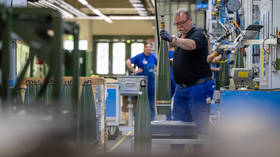Loss of Russian gas speeding Germany’s deindustrialization – media

Germany’s reign as an industrial superpower is “coming to an end” as the loss of cheap Russian natural gas amid the Ukraine crisis has dealt a “final blow” to manufacturers that were already struggling to remain cost-competitive, Bloomberg News reported on Saturday.
Industrial output in Germany has been dropping since 2017, and the downward spiral has accelerated since imports of Russian gas were cut off in 2022 to punish Moscow over the Ukraine conflict. Century-old factories are closing, and other companies are moving production lines to countries with lower costs, Bloomberg said.
“There’s not a lot of hope, if I’m honest,” Stefan Klebert, CEO at machinery maker GEA Group AG, told the outlet. “I am really uncertain that we can halt this trend. Many things would have to change very quickly.”
A survey last September by the Federation of German Industries showed that concerns over energy security and costs are the top reason for shifting investment abroad. Chemical makers were among the manufacturers hit hardest by the loss of Russian gas. BASF SE, Europe’s biggest chemical producer, and Lanxess AG are cutting thousands of jobs.
French tiremaker Michelin and US rival Goodyear are closing or downsizing their German plants. Maria Rottger, regional chief for Michelin, told Bloomberg that costs are too high for German exporters to thrive. “Despite the motivation of our employees, we have arrived at a point where we can’t export truck tires from Germany at competitive prices. If Germany can’t export competitively in the international context, the country loses one of its biggest strengths.”
The German finance minister acknowledged the crisis at a Bloomberg conference earlier this month. “We are no longer competitive,” he said. “We are getting poorer because we have no growth. We are falling behind.”
The German economy contracted in last year’s fourth quarter. A study by consulting firm Alvarez & Marsal found that 15% of German companies are in distress, meaning they have weak balance sheets. Germany’s distress rate increased from last year’s level of 9% and is the highest in Europe, the firm said.
Russian President Vladimir Putin said in December that Western nations are “playing the fool” by seeking Russia’s collapse to the detriment of their own people, rather than serving their own interests through economic cooperation. He has accused German leaders of foolishly hurting their own economy under US pressure and of silently accepting the bombings of the Nord Stream pipelines, which he blamed on the CIA.
Bloomberg said German manufacturers also have been hurt by crumbling infrastructure, an aging workforce, bureaucratic red tape, a weakening education system, and increased competition from China.
“You don’t have to be a pessimist to say that what we’re doing at the moment won’t be enough,” Volker Treier, foreign trade chief at the German Chambers of Commerce and Industry, told the outlet. “The speed of structural change is dizzying.”














